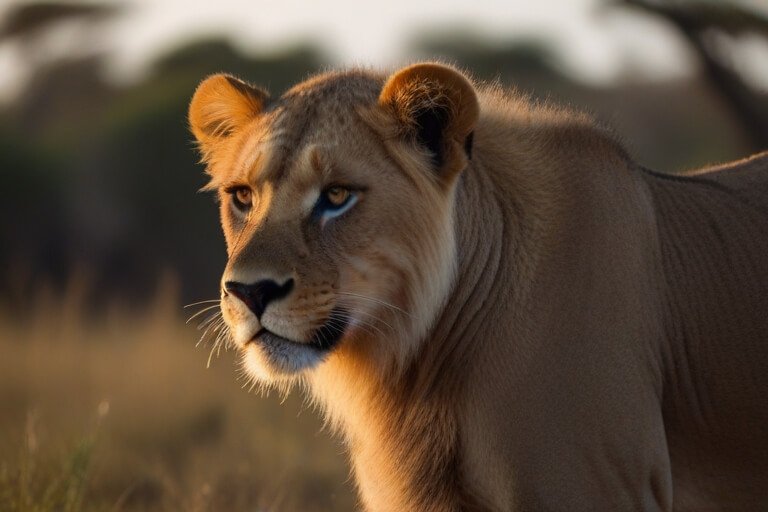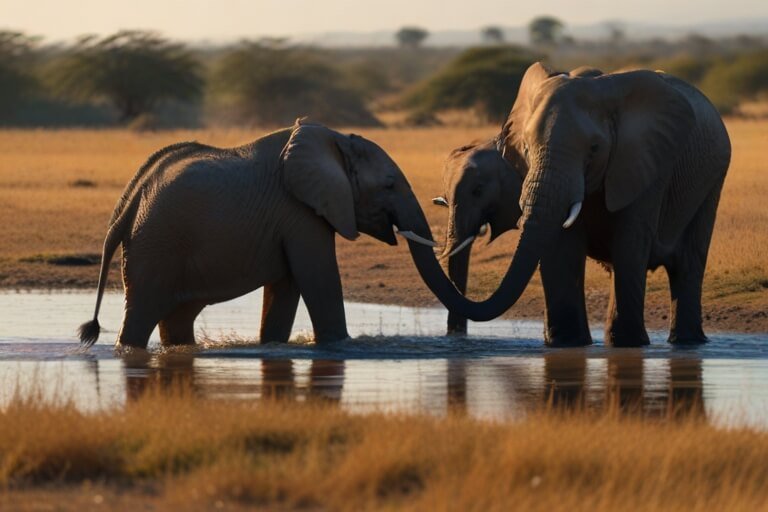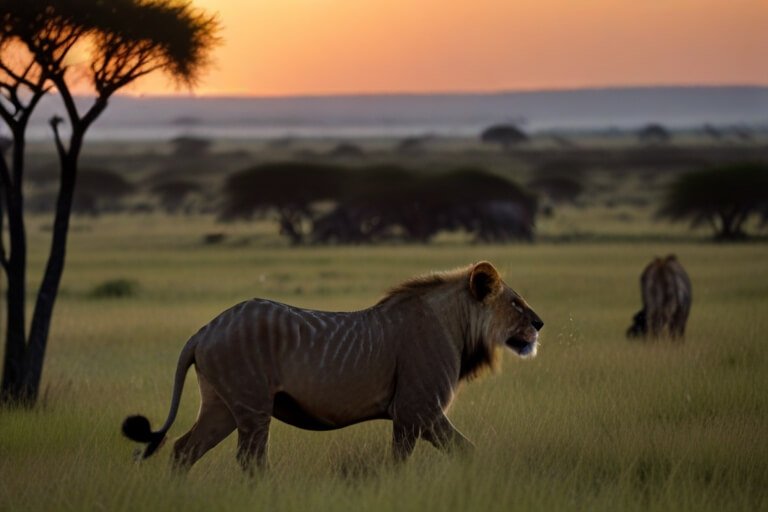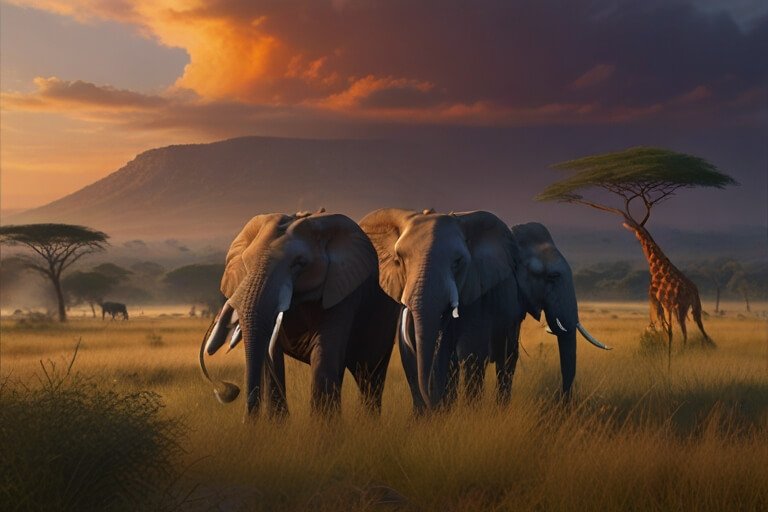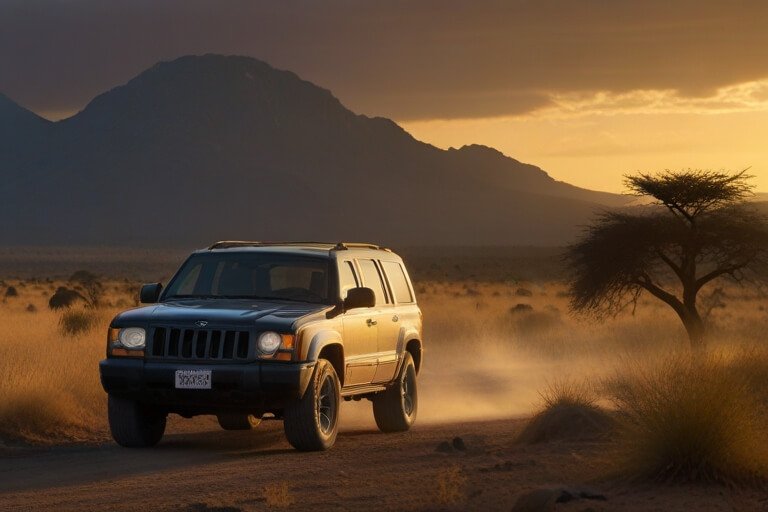Embarking on an African safari is like stepping into a mesmerizing storybook. The vast savannas, majestic wildlife, and vibrant cultures beckon travelers from around the globe. But How Many Days Do You Need for an African Safari ? Fear not! In this comprehensive guide, we’ll unravel the mystery and help you plan the perfect safari duration.
Key Takeaways of How Many Days Do You Need for an African Safari ?
Before we delve into the details, let’s summarize the main points:
- Minimum Duration: Allocate at least 5 to 7 days for a fulfilling safari experience.
- Factors to Consider: Budget, travel time between parks, jetlag, and beach time all influence your safari duration.
- Customize Your Safari: Tailor your trip based on personal preferences and desired activities.
Now, let’s explore each aspect in depth.
How Many Days Are Ideal?
The Ideal Duration: 5 to 7 Days
The sweet spot for an African safari typically falls within the range of 5 to 7 days. Here’s why:
Day 1: Arrival and Rest
- Arrival at Your Safari Destination:
- After landing in a gateway city (such as Johannesburg or Nairobi), you’ll connect to your specific safari destination (e.g., Kruger National Park or Serengeti).
- Booking accommodations in advance is crucial, especially during peak seasons.
- Rest and Acclimatization:
- Upon reaching your safari lodge or camp, take a moment to absorb the surroundings. You’re now in the heart of the African wilderness.
- Consider dedicating Day 1 to:
- Relaxation: Lounge by the pool, read, or simply enjoy the tranquility.
- Exploration: Take a gentle walk, listen to bird calls, and get a feel for the local culture.
- Adaptation: Jet lag can be challenging, so allow yourself downtime.
- Sunset and Sundowners:
- As the sun sets, find a scenic spot within the lodge or camp. Enjoy a “sundowner”—a drink while watching the sunset.
- Raise your glass to the start of an incredible journey.
- Dinner Under the Stars:
- Evening meals in the African bush are magical. Imagine dining under a star-studded sky, surrounded by nocturnal sounds.
- Share stories, savor delicious meals, and listen for distant lion roars.
Day 2: Into the Wilderness
- Morning Game Drive:
- Rise early for your first game drive. The cool morning air carries the promise of wildlife sightings.
- Your experienced guide will navigate the rugged terrain, pointing out tracks, birds, and animals.
- Breakfast in the Bush:
- Picture this: You’re sipping coffee while watching giraffes graze nearby. Breakfast in the African bush is an experience like no other.
- Share stories with fellow travelers and fuel up for the day ahead.
- Afternoon Safari:
- As the sun climbs higher, head out for another safari. The heat encourages animals to seek shade, making it an ideal time for sightings.
- Keep your camera ready—you never know when a leopard might appear!
Day 3: Into the Heart of the Reserve
- Game Drives and Guided Walks:
- Each day, you’ll explore different corners of the reserve. Buckle up for game drives that reveal Africa’s charismatic creatures.
- Guided walks allow you to connect with the smaller wonders—the intricate patterns on a butterfly’s wings or the scent of wild sage.
- Your expert guide will share insights about animal behavior, plant life, and the delicate balance of this ecosystem.
- Sunsets and Sundowners:
- As the sun descends, the savanna transforms. The sky ignites with hues of orange and pink, casting a warm glow over the landscape.
- Enjoy a sundowner—a refreshing drink—while perched atop the safari vehicle. Share stories with fellow travelers as the day bids farewell.
- Night Safaris:
- Venture into the darkness with a spotlight. Night safaris unveil a different side of the wild—the elusive nocturnal creatures.
- Listen to the symphony of frogs, owls, and distant hyenas as you scan the shadows for glowing eyes.
- Keep your camera ready; you might spot a leopard on the prowl or a bushbaby leaping through the trees.
Days 4 to 6: A Tapestry of Experiences
Diverse Habitats
- Exploring Various Ecosystems:
- Africa’s national parks and reserves are not monotonous. Each day, you’ll traverse different habitats—grassy plains, acacia woodlands, and riverine forests.
- These diverse environments harbor unique wildlife. Lions may roam the open savanna, while leopards prefer the dense thickets. Elephants graze near waterholes, and cheetahs sprint across the plains.
- The “Big Five” and Beyond:
- Seek out the iconic “Big Five”: lions, elephants, buffalos, leopards, and rhinos. These majestic creatures dominate the safari landscape.
- But don’t overlook the smaller gems—the vivid lilac-breasted rollers, the graceful impalas, and the playful warthogs. Each adds a brushstroke to your safari canvas.
Predator-Prey Dynamics
- Nature’s Drama Unfolds:
- Witness the primal dance of predator and prey. Lions stalk their quarry, cheetahs sprint after gazelles, and hyenas scavenge.
- The savanna becomes a theater of survival—a symphony of life and death. These interactions shape the very fabric of the ecosystem.
- The Hunt and the Hunted:
- Observe a lioness crouching in the grass, her eyes fixed on a herd of wildebeests. The tension builds. Will she strike?
- Meanwhile, zebras graze nearby, ever watchful for lurking predators. Their black-and-white stripes blend into the landscape—a camouflage against danger.
Birdwatching
- Avian Melodies:
- Africa is a paradise for bird enthusiasts. Binoculars in hand, you’ll discover a vibrant avian world.
- Spot the majestic fish eagles perched near water, their haunting calls echoing across the river. Marvel at the iridescent plumage of the lilac-breasted roller—a living jewel.
- The Symphony of Calls:
- As dawn breaks, the bush comes alive with birdcalls. The melodious trill of the African hoopoe, the rhythmic tapping of woodpeckers, and the haunting cry of the fish eagle.
- Each species contributes to the symphony—an intricate layer of sound woven into the fabric of the wild.
Cultural Encounters
- Threads of Connection:
- Beyond wildlife, connect with the people who call this land home. Visit a Maasai village or chat with Samburu tribespeople.
- Their stories, traditions, and dances add depth to your safari experience. You’ll see how their lives intersect with the natural world.
- Shared Moments:
- Gather around a campfire, listening to elders recount ancient tales. Feel the rhythm of a tribal dance—the pounding of feet on the earth.
- These moments are the golden threads that bind us all—a shared humanity woven into the grand tapestry of existence.
Day 7: Farewell (for Now)
- Last Morning Safari:
- Your final game drive is bittersweet. Cherish every moment—the sunrise, the rustling grass, and the distant roar of a lion.
- Say goodbye to the animals that have become part of your safari story.
- Departure:
- After breakfast, it’s time to bid farewell to the lodge staff and fellow travelers.
- As you board your flight back home, carry Africa’s magic with you—the rustle of savanna grass, the warmth of the sun, and the wild heartbeat of the continent.
Safari Statistics
Over the last five years, Africa has welcomed millions of travelers seeking its wild beauty:
| Year | Travellers Incoming |
|---|---|
| 2019 | 1.2 million |
| 2020 | 900,000 |
| 2021 | 1.1 million |
| 2022 | 1.3 million |
| 2023 | 1.4 million |
Africa’s allure remains irresistible, drawing adventurers from every corner of the globe.
Frequently Asked Questions (FAQs) About How Many Days Do You Need for an African Safari ?
| Question | Answer |
|---|---|
| How many days do I need for my safari? | You need at least 5 days to sufficiently enjoy your African Safari. This includes the time from when you arrive on your international flight to your safari destination until you board a flight back home. It also factors in travel time to the national park from the city and some hours of rest. |
| What factors influence how long a safari lasts? | The duration of your safari depends on several factors, including your budget, the number of parks you’ll visit, the type of accommodation, travel time between parks, and adjusting to jetlag. These factors collectively determine how much time you’ll spend on your safari. |
| How many days do most people take on an African safari? | Most tourists spend between 5-10 days on safari. This period includes the day they arrive in the safari country to the day they board their flight back home. Here’s a breakdown of those days: – Day 1: Arrival to the safari country, often spent resting or exploring the city. – Day 2: Travel to the national park (4-6 hours by road or around 1 hour if flying). |
| What’s the ideal number of days for a safari getaway? | For a well-rounded and rewarding safari experience, consider spending anywhere between 7 to 15 days. This allows you to explore Africa’s national parks and reserves fully. |
| What’s the minimum time for a worthwhile safari? | If you’re on a tight budget, spend a minimum of 3-4 days exploring the parks and reserves, excluding travel days between locations. |
| How many days are recommended for a successful safari? | Most travelers would need 7 to 10 days, accounting for arrival and departure times. If possible, add more days to explore additional activities and visit other African countries. |
| What’s the ideal safari duration? | Ten days is often considered ideal for an African safari. This allows time for acclimating to the time zone and experiencing multiple safari destinations. |
| What’s the best time of year for a safari? | The ideal time for a safari depends on the region you plan to visit. Generally, the dry season (from June to October) is recommended. During this period, wildlife congregates around water sources, making it easier to spot animals. However, some parks, like the Serengeti, are excellent year-round. Research the specific park you’re interested in for precise timing. |
| Can I do a safari in less than a week? | Yes, it’s possible to have a fulfilling safari experience in less than a week. Consider a 4-6 day safari, focusing on one or two parks. Prioritize game drives during peak wildlife activity hours. |
| What should I pack for a safari? | Pack lightweight, neutral-colored clothing, a wide-brimmed hat, sunscreen, insect repellent, comfortable closed-toe shoes, binoculars, a camera, and any necessary medications. Don’t forget your travel documents and adaptors for charging devices. |
| How do I choose between a guided safari and a self-drive safari? | Guided safaris offer expert knowledge, convenience, and safety. Self-drive safaris provide flexibility and independence. Consider your comfort level, budget, and desire for adventure when deciding. |
| What’s the best way to capture safari memories? | Bring a good camera with a telephoto lens. Practice using it before your trip. Capture not only animals but also landscapes, sunsets, and local culture. Remember to put the camera down occasionally and enjoy the moment. |
| Is it safe to go on safari? | Safaris are generally safe, especially when guided by professionals. Follow safety guidelines, respect wildlife, and listen to your guide. Malaria precautions are essential in certain regions. Check travel advisories and consult your doctor before the trip. |
| Can I see the “Big Five” on a short safari? | While it’s challenging to see all five iconic animals (lion, leopard, elephant, buffalo, and rhino) in a short safari, you can spot several of them. Longer safaris increase your chances of encountering all the Big Five. |
| What’s the best way to support conservation efforts during my safari? | Choose eco-friendly lodges and tour operators that prioritize sustainability. Avoid single-use plastics, stay on designated paths, and contribute to local conservation initiatives. |
Pre-Trip Checklist for Your African Adventure
Planning a trip to Africa? Whether you’re embarking on a wildlife safari, exploring ancient ruins, or soaking in the vibrant culture, proper preparation is key. Here’s a comprehensive pre-trip checklist to ensure you have everything you need:
Clothing (All Seasons)
- Neutral-Colored Clothing:
- Lightweight, breathable fabrics in earth tones (khaki, olive, beige) to blend with the natural surroundings.
- Long-sleeve shirts and pants to protect against sun, insects, and cool evenings.
- Comfortable Walking Shoes:
- Sturdy closed-toe shoes for game drives, bushwalks, and exploring.
- Hat and Sunglasses:
- Wide-brimmed hat to shield from the sun.
- Polarized sunglasses for glare reduction.
- Swimsuit:
- For beach destinations or lodges with pools.
- Layered Clothing:
- Mornings and evenings can be chilly, so pack a lightweight jacket or fleece.
- Rain Gear:
- Lightweight rain jacket or poncho for unexpected showers.
Additional Miscellaneous Items
- Filtered Water Bottle:
- Neck Wallet or Money Belt:
- Keep passports, credit cards, cash, and important documents secure and discreet.
- Virtual Private Network (VPN):
- Universal Power Adapter:
- Africa has various plug types; be prepared with a versatile adapter.
- First Aid Kit:
- Include basic medications, bandages, and any personal prescriptions.
Hiking and Outdoor Gear
- Daypack:
- For day trips, safaris, and hikes.
- Binoculars:
- Enhance wildlife viewing.
- Insect Repellent:
- Essential for malaria-prone areas.
- Sunscreen and Lip Balm:
- Protect against strong African sun.
- Camera and Extra Batteries:
- Capture those unforgettable moments.
Seasonal Considerations
- Dry Season (Winter):
- Warm clothing for chilly mornings and evenings.
- Beanie or hat for early game drives.
- Wet Season (Summer):
- Lightweight rain gear.
- Quick-dry clothing.
Health and Safety
- Immunizations and Medications:
- Consult a travel clinic for necessary shots.
- Refill prescriptions.
- Emergency Contacts:
- Program ICE (“in case of emergency”) numbers into your phone.
- Travel Insurance:
- Ensure coverage for medical emergencies and trip cancellations.
Remember, Africa is diverse, so adapt this checklist based on your specific destination and activities. Pack light, stay curious, and embrace the magic of the continent! 🌿🦓🌍
Estimated Costs
Here’s a rough breakdown of estimated costs per day:
| Category | Estimated Cost (Per Day) |
|---|---|
| Transportation | $150 – $300 (varies) |
| Accommodation | $100 – $500 (range) |
| Food | $30 – $100 (meal plans) |
| Activities | $50 – $200 (game drives, walks) |
Remember, these figures are approximate and vary based on your choices.
🌿🦓🌍 Wrapping Up: Your African Safari Adventure Awaits!
As we conclude this journey through the wild heart of Africa, let’s recap the essentials:
- Pack Smart: From neutral-colored clothing to sturdy shoes, prepare for comfort and practicality. Remember your swimsuit for those refreshing poolside moments.
- Embrace Diversity: Africa’s landscapes vary—from arid savannas to lush forests. Layer your clothing and adapt to the weather.
- Capture Magic: Binoculars, cameras, and extra batteries are your allies. The symphony of wildlife awaits your lens.
- Connect with Culture: Engage with local communities. Their stories and dances add vibrant threads to your safari tapestry.
- Health and Safety First: Immunizations, travel insurance, and emergency contacts are non-negotiable.
🌅 Your Call to Action
Now, it’s time to take action! 📸🌟
- Book Your Safari: Don’t delay—reserve your spot in the heart of the wild. Witness lions prowling, elephants trumpeting, and sunsets that paint the sky in gold.
- Share the Magic: Spread the word! Share this article with fellow adventurers, dreamers, and wildlife enthusiasts. Let them feel the pulse of Africa.
- Leave a Comment: Did this guide inspire you? Leave a comment below. Share your excitement, questions, or safari dreams.
- Subscribe: Join our newsletter for more travel tips, hidden gems, and captivating stories. Africa awaits, and you’re invited!
Remember, Africa isn’t just a destination—it’s an awakening. Let the rhythm of the savanna echo in your soul. 🌿🦓🌍


